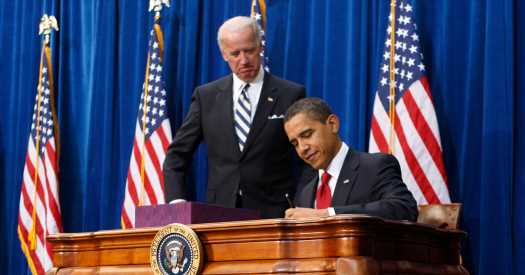Democrats, Pushing Stimulus, Admit to Regrets on Obama’s 2009 Response

In pitching President Biden’s relief package, Democrats have said their 2009 stimulus efforts under Barack Obama were insufficient. Those close to Mr. Obama have noticed.
By Astead W. Herndon
As Democrats pushed this month to pass the $1.9 trillion coronavirus relief package, they were eager to rebuke Republicans for opposing en masse a measure filled with aid to struggling Americans. But they had another target as well: the core policy of President Barack Obama’s first-term agenda.
Party leaders from President Biden on down are citing Mr. Obama’s strategy on his most urgent policy initiative — an $800 billion financial rescue plan in 2009 in the midst of a crippling recession — as too cautious and too deferential to Republicans, mistakes they were determined not to repeat.
The pointed assessments of Mr. Obama’s handling of the 2009 stimulus effort are the closest Democrats have come to grappling with a highly delicate matter in the party: the shortcomings in the legacy of Mr. Obama, one of the most popular figures in the Democratic Party and a powerful voice for bipartisanship in a deeply divided country.
The re-examination has irked some of the former president’s allies but thrilled the party’s progressive wing, which sees Mr. Biden’s more expansive plan as a down payment on his ambitious agenda. And it has sent an early signal that Mr. Biden’s administration does not intend to be a carbon copy of his Democratic predecessor’s. Times, all concede, have changed.
“This time, the feeling was, ‘We’re not very willing to negotiate what we think is needed,’” said former Senator Byron Dorgan, a Democrat from North Dakota who retired ahead of the 2010 midterm elections. “In 2009, I think the feeling was, ‘Oh we wanted more, but we didn’t get what we wanted.’”
The careful dance around Mr. Obama and his accomplishments continues a dynamic from the Democratic presidential primary. While taking care not to disparage his administration, several candidates stressed the need for the party to embrace a more take-no-prisoners political approach with Republicans; others criticized Mr. Obama’s policies on immigration: though he used an executive order to aid the Dreamers, he also pushed deportations and border detentions.
It also highlights the rapid change in Washington over a decade of partisan brawling. Both Mr. Obama and Mr. Biden came into office on promises of unity and bipartisanship in the face of an economic crisis, but Mr. Biden is the beneficiary of a changed landscape in the party. Democrats are now more cognizant of Republican obstruction, less deferential to the deficit hawks and energized by a growing progressive wing that has pulled the party’s ideological midpoint to the left.
A decade ago, Mr. Obama’s strategy reflected the Democratic Party’s mainstream, an insistence on negotiating with Republicans, keeping the Senate filibuster and trimming his own ambitions for a nation that he and others worried could handle only so much change after electing its first Black president. Now, the progressive criticism of that posture has become party canon.
Representative Alexandria Ocasio-Cortez of New York, a leading progressive voice, said the changes should be attributed partly to the growth of the left, but partly to an inadequate Democratic response to the Great Recession, which she said “created so much damage economically, for people, but it also created a lot of political damage for the party” by not being larger in scope.
“I came of age watching Democratic governance fail me and fail my family,” Ms. Ocasio-Cortez said.
Mr. Obama is himself a person who carefully takes stock of his presidential legacy and his place in Democratic Party politics. He has not publicly responded to the recent criticism of his stimulus strategy, and through a spokesman he declined a request to comment for this article.
Source: Read Full Article



